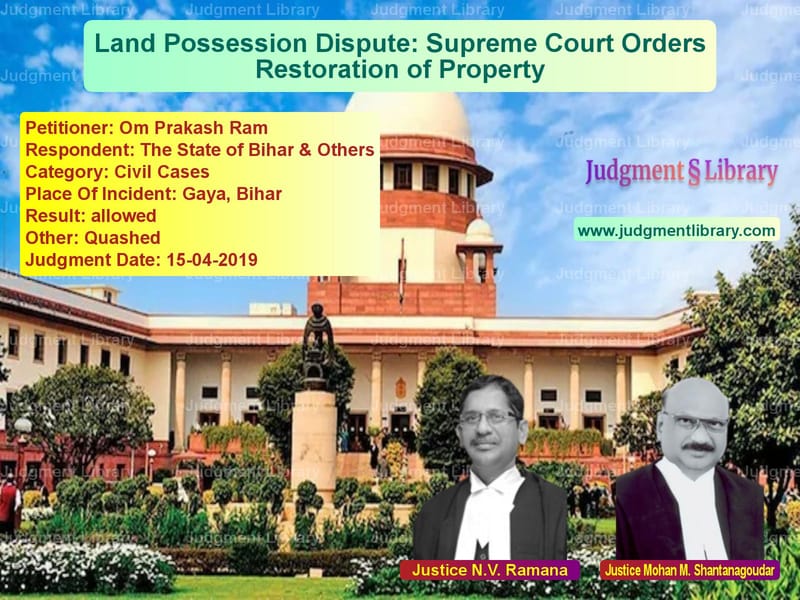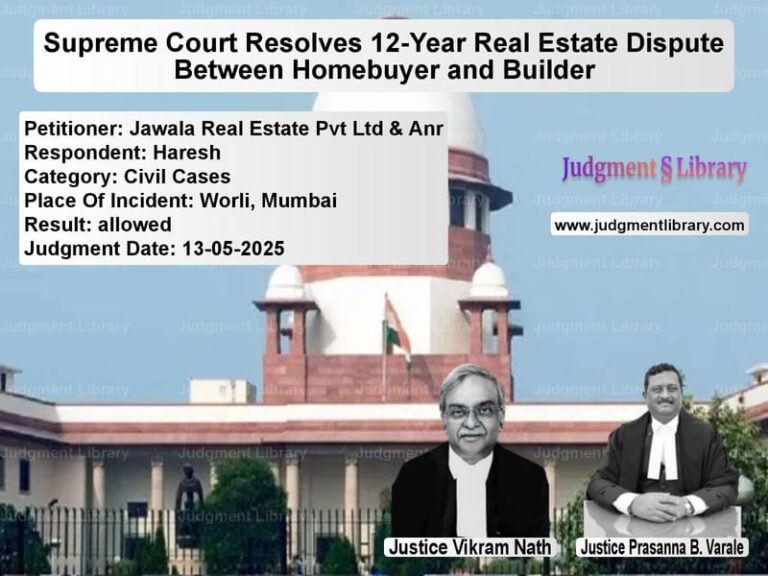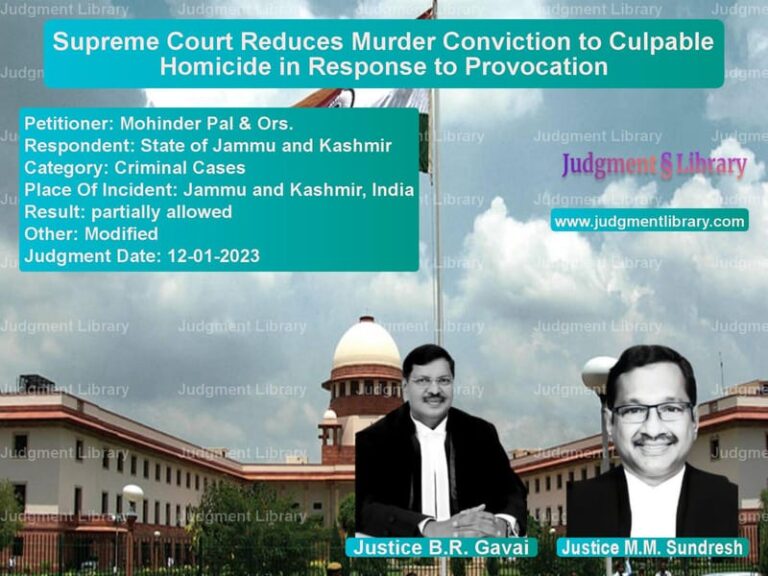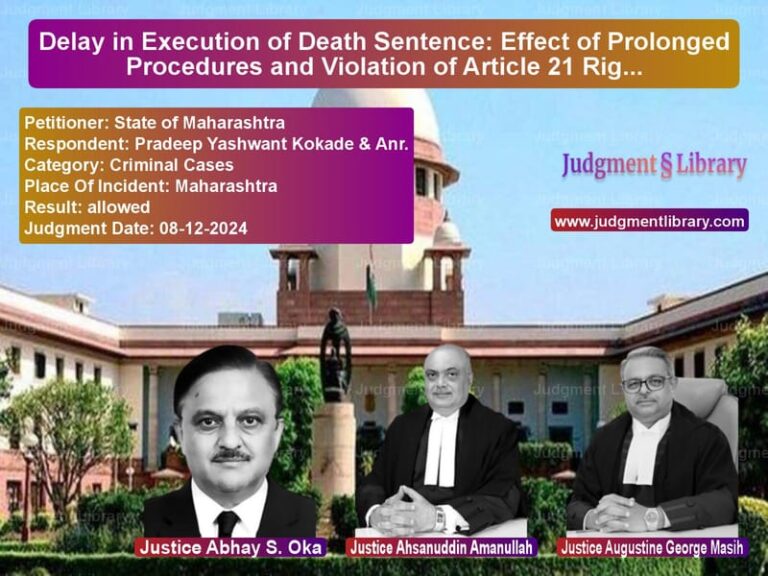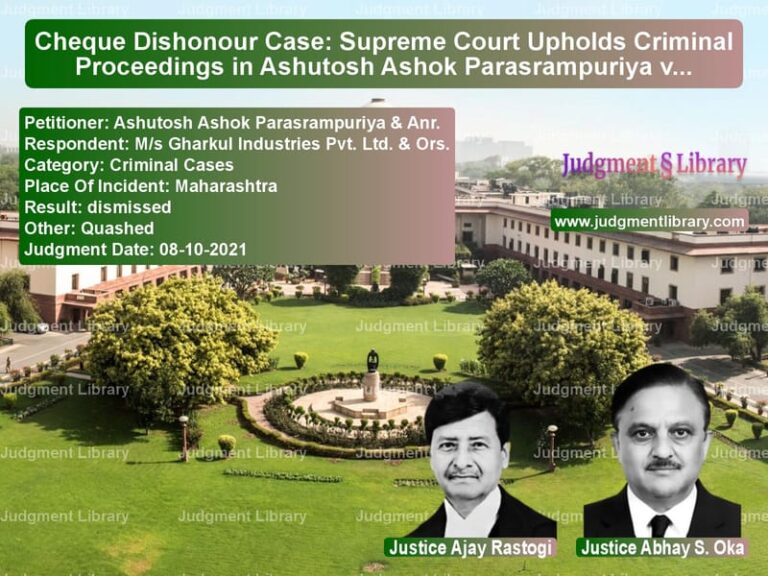Land Possession Dispute: Supreme Court Orders Restoration of Property
The case of Om Prakash Ram vs. The State of Bihar & Others is a significant legal battle concerning property ownership and possession rights. This dispute has a long history, originating in 1970, and has undergone multiple rounds of litigation, including an ex-parte decree, demarcation proceedings, and contempt petitions, ultimately leading to the Supreme Court’s intervention.
The Supreme Court, upon reviewing the case, ruled in favor of the appellant and ordered the restoration of possession, emphasizing procedural fairness and the principle of natural justice. This case serves as an important precedent for individuals facing dispossession based on questionable judicial orders.
Background of the Case
The case began when the father of the fifth respondent, Sidheshwar Prasad, initially filed Title Suit No. 105/1970, seeking declaration of title, restoration of possession, and eviction of the predecessor-in-interest of the appellant. This suit was dismissed on 09.06.1971. Despite this, the respondent initiated another suit in 1988 for declaration and injunction (later renumbered as Title Suit No. 32/1993), which was decreed ex-parte on 06.06.1994.
The appellant, Om Prakash Ram, was not served any notice regarding this suit and later discovered that the ex-parte decree had been used as the basis for multiple legal proceedings, including demarcation and contempt cases, which ultimately led to his eviction.
Legal Proceedings and the Appellant’s Challenge
After realizing the impact of the ex-parte decree, the appellant filed Miscellaneous Case No. 6/1999 to set aside the decree. The case went through extensive legal scrutiny, and finally, the ex-parte decree was set aside on 21.05.2003. However, despite this decision, the demarcation and contempt proceedings initiated by the respondents continued, leading to the appellant’s dispossession.
Key Legal Issues
- Was the ex-parte decree legally valid, considering the lack of notice to the appellant?
- Can proceedings based on an invalid decree continue to have legal consequences?
- Was the appellant’s dispossession justified under law?
- Did the lower courts err in dismissing the appellant’s plea for restoration of possession?
Arguments by the Petitioner
The appellant, Om Prakash Ram, through his legal representatives, presented the following arguments:
- The ex-parte decree dated 06.06.1994 was obtained in violation of principles of natural justice, as no notice was served upon the defendants.
- Despite the setting aside of the ex-parte decree in 2003, the respondents continued to rely on it for demarcation and eviction proceedings.
- The appellant was unlawfully dispossessed based on judicial orders that were later invalidated.
- The High Court failed to recognize the illegality of the proceedings and did not provide the appellant with a fair remedy.
Arguments by the Respondents
The respondents, represented by the State of Bihar and private parties, countered:
- The demarcation proceedings and contempt petitions were legally conducted, and the orders were implemented in accordance with law.
- The High Court had reviewed the matter and dismissed the appellant’s challenge to the demarcation order.
- Once possession had been transferred, it could not be reversed, as it was done under court orders.
- The appellant failed to challenge the contempt proceedings in time, leading to the loss of possession.
Supreme Court’s Observations
The Supreme Court reviewed the case in detail, noting several irregularities:
“The entire exercise by the fifth respondent to get the disputed property demarcated and to secure possession thereof was based on the ex-parte decree dated 06.06.1994. Since the decree was ultimately set aside, all subsequent orders relying upon it must also be set aside.”
The Court found that the appellant was denied due process, as he was not made a party in the relevant proceedings. The orders passed in the demarcation case, writ petition, and contempt proceedings were all based on a decree that was later declared null and void.
Final Judgment
The Supreme Court ruled in favor of the appellant and ordered the restoration of possession. The Court held:
“It is evident that the possession of the property in question needs to be restored in favor of the appellant, inasmuch as he was dispossessed based on the ex-parte decree dated 06.06.1994, which ultimately came to be set aside.”
As a result, the petition was allowed, and all related proceedings based on the ex-parte decree were quashed. The appellant was granted the right to reclaim his property.
Significance of the Judgment
This case is a crucial precedent in property law, highlighting the importance of ensuring that judicial proceedings adhere to principles of fairness and due process. The judgment reinforces that any legal action based on an invalidated decree cannot stand and must be reversed to uphold justice.
Petitioner Name: Om Prakash Ram.Respondent Name: The State of Bihar & Others.Judgment By: Justice N.V. Ramana, Justice Mohan M. Shantanagoudar.Place Of Incident: Gaya, Bihar.Judgment Date: 15-04-2019.
Don’t miss out on the full details! Download the complete judgment in PDF format below and gain valuable insights instantly!
Download Judgment: Om Prakash Ram vs The State of Bihar & Supreme Court of India Judgment Dated 15-04-2019.pdf
Direct Downlaod Judgment: Direct downlaod this Judgment
See all petitions in Property Disputes
See all petitions in Specific Performance
See all petitions in Damages and Compensation
See all petitions in Judgment by N.V. Ramana
See all petitions in Judgment by Mohan M. Shantanagoudar
See all petitions in allowed
See all petitions in Quashed
See all petitions in supreme court of India judgments April 2019
See all petitions in 2019 judgments
See all posts in Civil Cases Category
See all allowed petitions in Civil Cases Category
See all Dismissed petitions in Civil Cases Category
See all partially allowed petitions in Civil Cases Category

